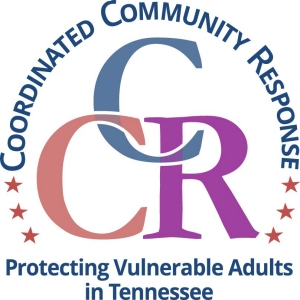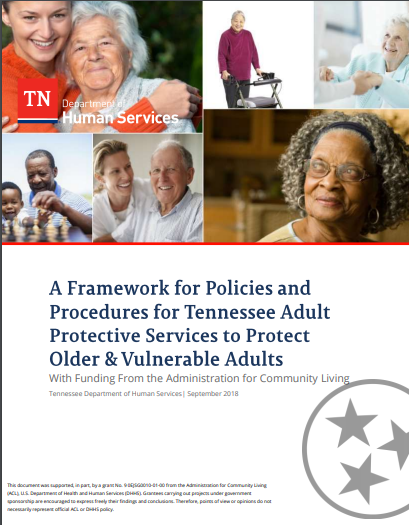Adult Protective Services

APS Mission
To protect and support vulnerable adults through collaboration.
What We Do
Adult Protective Services (APS) staff investigate reports of abuse, neglect (including self-neglect) or financial exploitation of adults who are unable to protect themselves due to a physical or mental limitation. APS staff assess the need for protective services and provide services to reduce the identified risk to the adult.
APS may investigate abuse/neglect/exploitation of an adult in any living arrangement including nursing homes, group homes, their own homes, homes of relatives or friends, etc. The exception is residents of state operated institutions for individuals with mental illness or developmental disabilities.
For additional information, download our brochure.
Do you need to report suspected abuse of a vulnerable or elderly adult?
Call: Toll Free 1-888-APS-TENN (1-888-277-8366)
Or, report suspected abuse online at our secure site: https://reportadultabuse.dhs.tn.gov/
The General Assembly passed the Tennessee Protective Services for Elderly Persons Act in 1974. This was later repealed and amended to include all adults with the passage in 1978 of the Tennessee Adult Protection Act. To read Title 71, Chapter 6, Part 1, click here.
Neglect occurs when the basic needs of a dependent adult are not met by a caregiver. Neglect may be unintentional, resulting from the caregiver's lack of ability to provide or arrange for the care or services the adult requires. Neglect also may be due to the intentional failure of the caregiver to meet the adult's needs.
Self-Neglect occurs when a dependent adult is unable to care for him/herself or to obtain needed care. The impairments result in significant danger to the adult and in some situations, deterioration can occur to the point that the adult's life may be at risk.
Abuse (physical, sexual, and emotional) generally involves more extreme forms of harm to the adult, including the infliction of pain, injury, mental anguish, unreasonable confinement, or other cruel treatment.
Financial Exploitation occurs when a caregiver improperly uses funds intended for the care or use of the adult. These are funds paid to the adult or to the caregiver by a governmental agency.
INVESTIGATION PROCESS / WHAT WILL HAPPEN
A DHS/APS counselor will visit the adult to determine the need for protective services.
Family, friends, or professionals who know about the adult's situation may be contacted.
The APS counselor will work with the adult victim and others (family, friends, volunteers, and professionals) to assist the adult and reduce the danger.
If the adult victim is capable, he/she will be encouraged to make decisions regarding needed care or services. Whenever it is possible, Adult Protective Services staff will assist the adult in remaining in his/her home or community.
Some adults may refuse help. Legally, services cannot be forced on an adult, except in special circumstances as specified in the law. Involuntary services always require a court order.
Legal action is used only after all other appropriate solutions have been explored.
Report Abuse and Neglect
Toll free: 1-888-APS-TENN (1-888-277-8366)
Physical Abuse
- Bruising, especially on the torso or head
- Frequent injuries, with the excuse of “accidents”
- Signs of being restrained, such as rope marks on wrists
Emotional Abuse
- Isolation of the vulnerable adult or refusal to allow visits with the vulnerable adult alone
- Threatening, belittling or controlling behavior by the caregiver that you see
- Behavior that mimics dementia, such as rocking, sucking or mumbling
- Outbursts or extreme anger or punishment like the silent treatment
Sexual Abuse
- Frequent genital or urinary tract irritation and infections
- Indication of bruising to genitals, upper torso or upper thighs
- Vulnerable adult indicates discomfort with caregiver while bathing, dressing or toileting
- Vulnerable adult has little or no privacy for bathing or dressing which bothers him or her
Neglect (Including Self-Neglect)
- Unusual weight loss, malnutrition, dehydration
- Untreated physical problems, such as bed sores
- Unsanitary living conditions: dirt, bugs, soiled bedding and clothes
- Being left un-bathed
- Unsuitable clothing or covering for the weather
- Unsafe living conditions (no heat or running water; faulty electrical wiring, other fire hazards)
Financial Exploitation
- Sudden changes in the vulnerable adult’s financial condition
- Financial activity the vulnerable adult couldn’t have done, such as an ATM withdrawal when the account holder is bedridden
- No food in the home, the utilities are cut off, and the home is not maintained

Two years ago the Federal Administration for Community Living awarded TDHS a grant to establish a Coordinated Community Response (CCR) involving state and non-profit agencies that play a role in providing protective services. More than 20 organizations and agencies have been meeting monthly ever since to create solutions that:
- Improve communications among agencies and organizations.
- Streamline investigations.
- Help identify and reduce the number of unsanitary and abusive unlicensed facilities.
Learn more about Tennessee's Coordinated Community Response Strategy, and how it serves to help Tennessee's older and vulnerable adults in the video below.
Read A Framework for Policies and Procedures for Tennessee Adult Protective Services to Protect Older & Vulnerable Adults which highlights the Coordinated Community Response approach.
The Tennessee Department of Human Services' Adult Protective Services unit is partnering with the Tennessee Department of Commerce and Insurance and the Tennessee Vulnerable Adult Coalition (TVAC) to help raise awareness and stop elder abuse. To view our Public Service Announcement, click on the window below.
